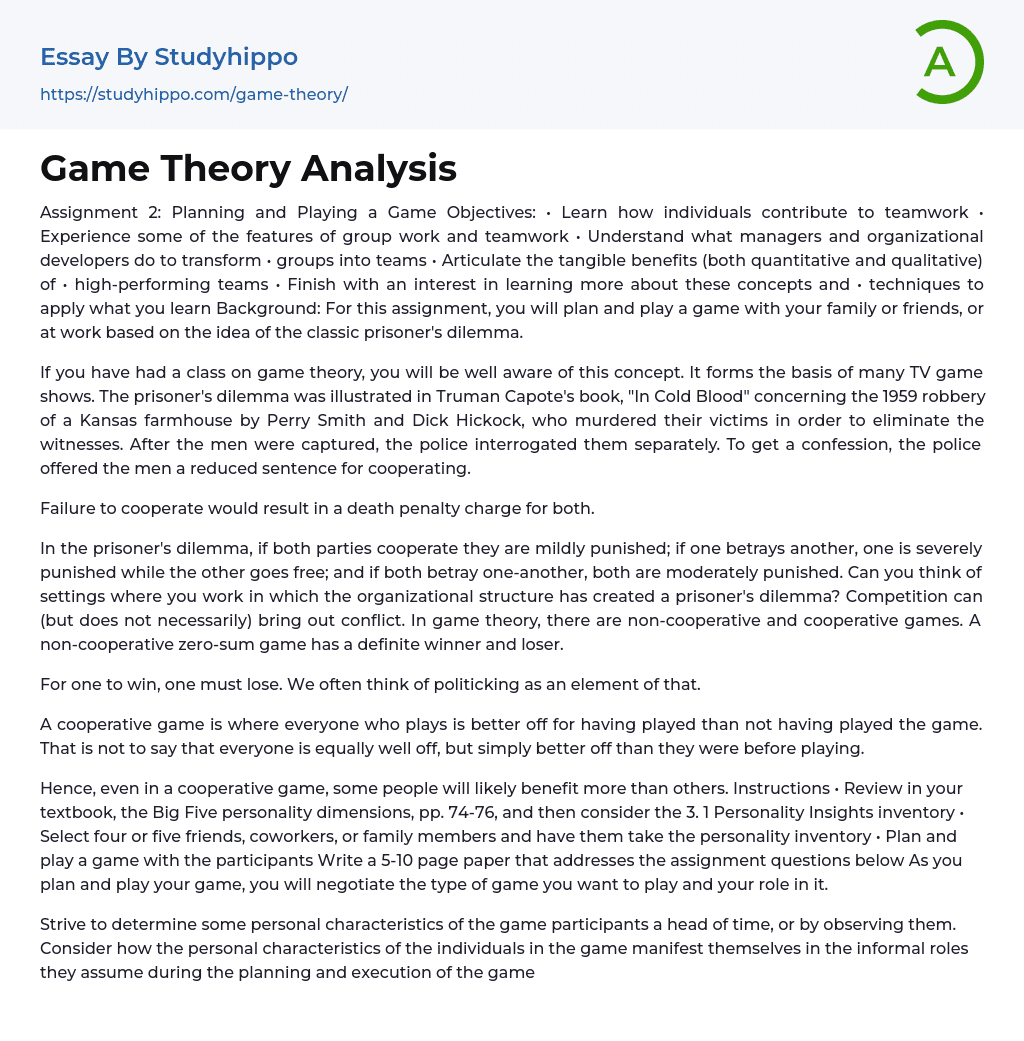If you have had a class on game theory, you will be well aware of this concept. It forms the basis of many TV game shows. The prisoner's dilemma was illustrated in Truman Capote's book, "In Cold Blood" concerning the 1959 robbery of a Kansas farmhouse by Perry Smith and Dick Hickock, who murdered their victims in order to eliminate the witnesses. After the men were captured, the police interrogated them separately. To get a confession, the police offered the men a reduced sentence for cooperating.
Failure to cooperate would result in a death penalty charge for both.
In the prisoner's dilemma, if both parties cooperate they are mildly punished; if one betrays another, one is severely punished while the other goes free; and if both betray one-another, both are moderately punished. Can you think of settings where you work
...in which the organizational structure has created a prisoner's dilemma? Competition can (but does not necessarily) bring out conflict. In game theory, there are non-cooperative and cooperative games. A non-cooperative zero-sum game has a definite winner and loser.
For one to win, one must lose. We often think of politicking as an element of that.
A cooperative game is where everyone who plays is better off for having played than not having played the game. That is not to say that everyone is equally well off, but simply better off than they were before playing.
Hence, even in a cooperative game, some people will likely benefit more than others. Instructions Review in your textbook, the Big Five personality dimensions, pp. 74-76, and then consider the coworkers, or family members and have them take the personality inventory Plan
and play a game with the participants Write a 5-10 page paper that addresses the assignment questions below As you plan and play your game, you will negotiate the type of game you want to play and your role in it.
Strive to determine some personal characteristics of the game participants a head of time, or by observing them. Consider how the personal characteristics of the individuals in the game manifest themselves in the informal roles they assume during the planning and execution of the game. For the purpose of this assignment, you will want both a cooperative and a competitive element.
To do that, you can form several groups to compete and cooperate with each other, or you can have individuals in one group compete and cooperate. You can use rewards and/or punishments to create the competitive/cooperative motivations.
Evaluation: When groups are formed, we want to consider how organizational structures, processes, and situations impact on group motivation, politics, and goals achievement. Alignment of all of these structural, personal, and interpersonal components will help to ensure that the group will meld into a team.
A defining feature of teamwork (versus group work) is cooperation! One of the factors that affect cooperation is conflict. Conflict is defined as when someone perceives that his/her interests are opposed or negatively impacted by another. Conflict can at times produce positive results depending on the basis for the conflict and how the conflict is handled (functional conflict). The worst kind of dysfunctional conflict produces betrayal.
Note that team performance can be observed in how well the team coordinates their interdependencies, works efficiently, communicates, and accomplishes their mission.
- Bias essays
- Big Five Personality Traits essays
- Body Image essays
- Mind essays
- Motivation essays
- Phobias essays
- Thought essays
- Abnormal Psychology essays
- Abraham Maslow essays
- Attachment Theory essays
- Authority essays
- Behaviorism essays
- Classical Conditioning essays
- Cognitive Psychology essays
- Counseling essays
- Developmental Psychology essays
- Educational Psychology essays
- Erik Erikson essays
- Family Therapy essays
- Jean Piaget essays
- Maslow's Hierarchy Of Needs essays
- Mental Health essays
- Operant Conditioning essays
- Personality Psychology essays
- Positive Psychology essays
- Psychoanalysis essays
- Psychotherapy essays
- Sigmund Freud essays
- Social Psychology essays
- Stanford Prison Experiment essays
- Supersize Me essays
- Administration essays
- Architect essays
- Discipline essays
- Doctor essays
- Engineer essays
- Farmer essays
- Hunter essays
- Labor essays
- Model essays
- Nurse essays
- Pilot essays
- Police Officer essays
- Professionalism essays
- Social Work essays
- Stakeholders essays
- Teamwork essays
- Experiment essays
- Explorer essays
- Hypothesis essays




